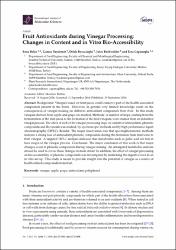Fruit antioxidants during vinegar processing: changes in content and in vitro bio-accessibility
Künye
Bakir, S., Toydemir, G., Bayacioglu, D., Beekwilder, J., Capanoglu, E. (2016). Fruit antioxidants during vinegar processing: changes in content and in vitro bio-accessibility. International Journal of Molecular Sciences, 17(10). https://doi.org/10.3390/ijms17101658Özet
Background: Vinegars based on fruit juices could conserve part of the health-associated compounds present in the fruits. However, in general very limited knowledge exists on the consequences of vinegar-making on different antioxidant compounds from fruit. in this study vinegars derived from apple and grape are studied. Methods: A number of steps, starting from the fermentation of the fruit juices to the formation of the final vinegars, were studied from an industrial vinegar process. the effect of each of the vinegar processing steps on content of antioxidants, phenolic compounds and flavonoids was studied, by spectroscopic methods and by high-performance liquid chromatography (HPLC). Results: the major observation was that spectrophotometric methods indicate a strong loss of antioxidant phenolic compounds during the transition from fruit wine to fruit vinegar. A targeted HPLC analysis indicates that metabolites such as gallic acid are lost in later stages of the vinegar process. Conclusion: the major conclusion of this work is that major changes occur in phenolic compounds during vinegar making. An untargeted metabolite analysis should be used to reveal these changes in more detail. in addition, the effect of vinegar processing on bio-accessibility of phenolic compounds was investigated by mimicking the digestive tract in an in vitro set up. This study is meant to provide insight into the potential of vinegar as a source of health-related compounds from fruit.


















